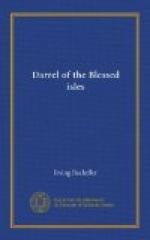The streets were dark and silent as they left the shop. They went up a street beyond the village limits and looked off in Cook’s field but saw no light there. While they stood looking a flame rose and spread. Soon they could see figures in the light, and, climbing the fence, they hastened across an open pasture. Coming near they saw a score of men with masks upon their faces.
“Give him the tar and feathers,” said a strange voice.
“Not if he will confess an’ seek forgiveness,” another answered.
“Down to your knees, man, an’ make no outcry, an’ see you repeat the words carefully, as I speak them, or you go home in tar and feathers.”
They could hear the sound of a scuffle, and, shortly, the phrases of a prayer spoken by one voice and repeated by another.
They were far back in the gloom, but could hear each word of that which follows: “O God, forgive me—I am a liar and a hypocrite—I have the tongue of scandal and deceit—I have robbed the poor—I have defamed the good—and, Lord, I am sick—with the rottenness of my own heart. And hereafter—I will cheat no more—and speak no evil of any one—Amen.”
“Now, go to your home, Riley Brooke,” said the voice, “an’ hereafter mind your tongue, or you shall ride a rail in tar and feathers.”
They could see the crowd scatter, and some passed near them, running away in the darkness.
“Stoop there an’ say not a word,” the tinker whispered, crouching in the grass.
When all were out of hearing, they started for the little shop.
“Hereafter,” said Darrel, as they walked along, “God send he be more careful with the happiness of other men. I do assure thee, boy, it is bitter, bitter, bitter.”
XXVIII
Darrel at Robin’s Inn
Trove had much to help him,—youth, a cheerful temperament, a counsellor of unfailing wisdom. Long after they were gone he recalled the sadness and worry of those days with satisfaction, for, thereafter, the shock of trouble was never able to surprise and overthrow him.
After due examination he had been kept in bail to wait the action of the grand jury, soon to meet. Now there were none thought him guilty—save one or two afflicted with the evil tongue. It seemed to him a dead issue and gave him no worry. One thing, however, preyed upon his peace,—the knowledge that his father was a thief. A conviction was ever boring in upon him that he had no right to love Polly. A base injustice it would be, he thought, to marry her without telling what he had no right to tell. But he was ever hoping for some word of his father—news that might set him free. He had planned to visit Polly, and on a certain day Darrel was to meet him at Robin’s Inn. The young man waited, in some doubt of his duty, and that day came—one of the late summer—when he and Darrel went afoot to the Inn, crossing hill and valley, as the crow flies, stopping here and there at isles of shadow in a hot amber sea of light. They sat long to hear the droning in the stubble and let their thought drift slowly as the ship becalmed.




